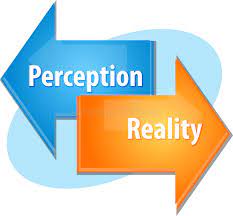By: Brian G. Chilton | July 25, 2022
Is truth found in personal perceptions or is it grounded in an independent transcendent reality? Multiple businesses and even churches have used the phrase “perception is reality” when referencing the importance of meeting customer needs. If a customer feels that he or she is not getting the service they expect, then their perception of the received service will lead them away from the business in question. While it is not the intent of this author to endorse or condemn a business or church’s employment of such a phrase, as one who is theologically and philosophically inclined, every statement and concept must be tested. Thus, it must be asked, does a person’s views of a certain activity and/or thought make that belief real or even true?
The phrase found its origin in political strategist Lee Atwater who worked for the George Bush, Sr. political campaign in 1988. Atwater, who died from brain cancer three years after devising the phrase, helped Bush reclaim a 17-point deficit to win the 1988 Presidential election.[1] Atwater held that if one could lead the populace to believe something as true, then that person’s perception of the truth becomes reality to that group. Thus, it mattered less about what was true than what people thought was true.
Others have furthered Atwater’s assessment to claim that perception means more than reality.[2] That is, a person’s belief about what is true matters more than what is actually true. If the statement is understood correctly, then it seems to be a situation in which truth is altered to meet the needs of the one promoting a certain perception. But is this not the same as promoting a falsehood?
This article is not intended to be political. As such, it does not endorse any political party or candidate. The only reason political persons were mentioned is that the phrase found its origin in politics. As previously noted, the article does not intend to disparage anyone who has used the phrase. However, the seeker of truth must ask whether the logic of the phrase holds philosophically, as the philosopher questions everything.
Sure, wars have been fought and political agendas have been set because of the perception of a person or group of people. But do those perceptions automatically ensure that the promoted perception matches reality as it truly exists? Surely, the perceptions of Hitler and radical extremist groups do not match reality. Furthermore, does this not cause the nature of reality to become dependent on what one thinks rather than what actually is? There are quite a few logical problems with the phrase, many more than I assumed when I first started my investigation.
There are two camps in this debate: reality-over-perception (that is, reality holds greater importance than a person’s perception) versus perception-over-reality (that a person’s perception of truth matters more than what exists in space and time). The reality-over-perception theory is seemingly the preferable viewpoint. As we examine the debate, let us first define what reality and perception are. Then, we will need to draw distinctions between the two entities before showing why reality, in fact, matters more than perception rather than vice versa. Finally, we will issue a warning of what could come when perceptions are elevated over truth and reality.
The Nature of Reality and Perception
The core issue at hand is what makes something true. Is truth something that is external to a person? Or is truth relative and found within a person’s belief system? This is the crux that forms the primary distinction between the reality-over-perception theory and Atwater’s perception-over-reality theory. What is truth? The answer shapes how one responds to the debate.
Truth (i.e., reality) is best defined by Aristotle who wrote, “To say that what is is not, or that what is not is, is false; but to say that what is is, and what is not is not, is true; and therefore also he who says that a thing is or is not will say either what is true or what is false.”[3] In other words, truth is that which corresponds with external realities. Thus, truth is transcendent. It exists outside of a person’s opinion and desire. If a person claims that the sky is red when the wavelengths match the color that is identified as blue, then it cannot be said that the person is speaking the truth. Comparably, a student who claims that 5 + 5 = 15 is most assuredly wrong despite their convictions to the otherwise.
In contrast, perception is how a person perceives reality through the lens of their sense experience. Philosophically, this includes a concept known as the qualia, which is defined as “the aspects of your sensations—the way things look, feel, smell, taste, and sound.”[4] A person’s qualia may differ according to their experience of reality. For instance, some Protestants cheer the work of Martin Luther as he led the Protestant Reformation of the 1500s. In stark contrast, some Catholics abhor his work, believing that he unnecessarily split the church. The beliefs of each group impacted the perception of their qualia and vice versa.
Why the Transcendent Nature of Reality Trumps Perception
To recap, truth is a transcendent reality that exists beyond the scope of a person’s experience, while a person’s perception is how an individual or group interprets their qualia. However, reality, by necessity, supersedes individual perception because of the nature of truth.
Previously, the color of the sky was given as an example. Some may argue that a person with regular vision may see colors to one degree, whereas those who are color blind perceive the color in a different hue. Thus, it may appear that each person’s qualia is different. The argument is not as strong as taken at first glance, because even though the color is perceived differently, the wavelength of the color in question remains the same. So, even if one person’s qualia led the person to believe that a color is purple when in fact it is blue, the wavelength of the color in question is the same even though perceived differently.
Another example given concerned the Protestant Reformation. While some Protestants and Catholics view the work of Luther and the Reformation differently, the common transcendent reality was that Luther and other Reformers led the movement in the 16th century. A person’s perception of the event does not change the historical realities found in Luther’s work and other Reformers of the time.
Lastly, you have probably heard the philosophical puzzle of a tree in a forest. If a tree fell in the wilderness, would it make a sound even if no one was present to hear it? Because of the workings of physics, soundwaves are created when vibrations are passed through mediums such as air or water. Thus, the crashing of a felled tree would create the vibrations necessary to create a sound regardless of how few hearers are there to audibly receive the vibrations. Even if no one is present, the actualized vibrations would create the potential for hearing. As these exercises show, reality is not dependent on personal perception. Instead, a person’s perceptions are based upon the external reality experienced.
The Consequences of Elevating Perception Over Reality
If people begin elevating perception over reality, then the basis by which science and historical studies are conducted are demolished. No one could ever postulate what occurred prior to the present time and no scientific advancements could be made as everything would become personal preference. The healthcare industry would suffer as each person could claim that they do not have a disease even though the evidence suggests that he or she does. Then, the person would not receive the treatment that could cure the disease that he or she does not believe exists.
Theologically, faith matters would then become a matter of self-invention rather than encounters with the divine. Self-deluded cult leaders could then persuade countless individuals to do reprehensible things for the leader. The leader would argue that his perception is true even if reality does not support his claims. People could never be held accountable for crimes, and judges could never convict criminals. In literature, the author’s intent is replaced by the reader’s misconceptions, and so on. Diminishing the external reality of truth creates a slippery slope that leads to a host of problems.
Conclusion
Truth matters. Truth grounds and establishes us. Jesus noted the freeing nature of truth, stating that “the truth will set you free” (John 8:32).[5] It is understood why businesses and churches gravitate toward the phrase. Because these institutions want to create the best experience for their customers, and rightfully so. The intention behind the phrase is justified and understandable. However, the philosophical connotations of the phrase are quite troubling. Therefore, I propose that we should replace the phrase perception is reality with the phrase perception is a personal view of reality. In this way, the nature of truth is not diminished and the importance of the person’s perception of reality is also emphasized. The provider of a service will want to afford the best experience possible for his or her customers. But there is too much at stake to eliminate the value of truth itself.
About the Author
Brian G. Chilton is a Ph.D. Candidate in the Theology and Apologetics program at Liberty University. He is the host of The Bellator Christi Podcast and the founder of Bellator Christi. He received his Master of Divinity in Theology from Liberty University (with high distinction); his Bachelor of Science in Religious Studies and Philosophy from Gardner-Webb University (with honors); earned a Certificate in Christian Apologetics from Biola University and plans to pursue philosophical studies in the future. Brian is a member of the Evangelical Theological Society and the Evangelical Philosophical Society.
Brian has served in pastoral ministry for nearly 20 years and currently serves as a clinical hospice chaplain. Additionally, he serves as an editor for the Eleutheria Journal. At the prompting of the Lord, Brian established Bellator Christi Ministries in 2012. The ministry is aimed to provide readily available resources in theology, apologetics, biblical studies, and philosophy to those who want to know what Christianity teaches and why it should be believed. In 2019, Brian published his first book entitled the Layman’s Manual on Christian Apologetics. After finishing his Ph.D., Brian intends to publish more books. His areas of expertise include early NT creeds, near-death experiences, biblical reliability, the blend of divine sovereignty and human freedom, and the need for empathy.
https://www.amazon.com/Laymans-Manual-Christian-Apologetics-Essentials/dp/1532697104
Notes
[1] Simon Kelner, “Perception is Reality: The Facts Won’t Matter in Next Year’s Election,” Independent.co.uk (Oct. 14, 2014), https://www.independent.co.uk/voices/comment/perception-is-reality-the-facts-won-t-matter-in-next-year-s-general-election-9829132.html.
[2] “Perception is more important than reality. If someone perceives something to be true, it is more important than if it is in fact true. This does not mean that you should be duplicitous or deceitful, but don’t go out of your way to correct a false assumption if it plays to your advantage.” Ivanka Trump, The Trump Card: Playing to Win in Love and Life (New York: Simon & Schuster, 2009), Kindle.
[3] Aristotle, Metaphysics 1011b25, in Aristotle in 23 Volumes, Vols.17, 18, Translated by Hugh Tredennick. (Medford, MA: Cambridge, MA, Harvard University Press; London, William Heinemann Ltd., 1933, 1989), Logos Bible Software.
[4] Edward Feser, Philosophy of Mind (London, UK: Oneworld, 2006), 15.
[5] Unless otherwise noted, all quoted Scripture comes from the Christian Standard Bible (Nashville, TN: Holman, 2020).
© 2022. BellatorChristi.com.






Thanks for this thoughtful article Brian.
I found your health and disease implication interesting. Indeed the conventional healthcare industry would suffer if people didn’t accept their idea of a specific cure for every disease paradigm. I think with this example you personally confounded perception with truth and reality. No doubt a testimony to the success of the healthcare industry in shaping all of our perceptions of reality when it comes to biology and our health.